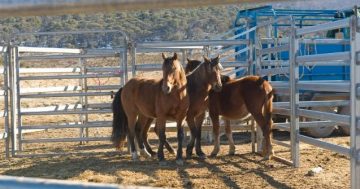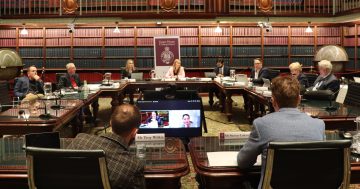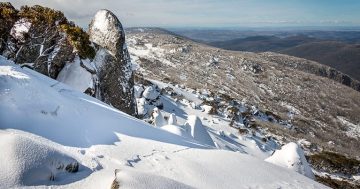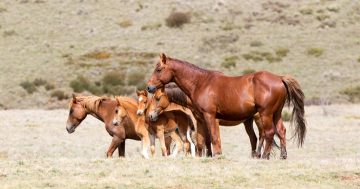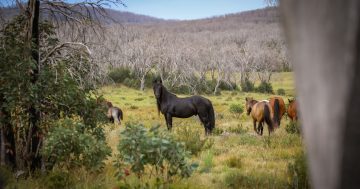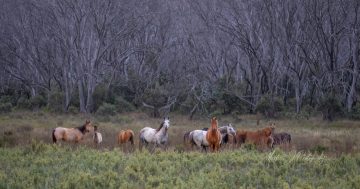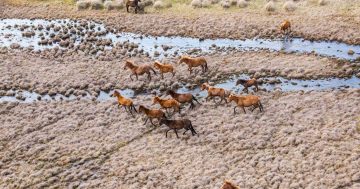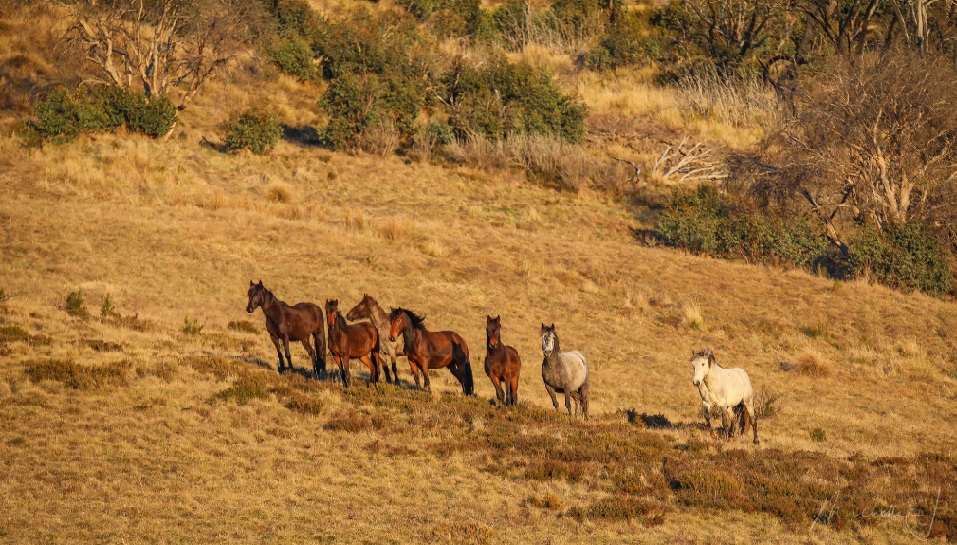
Of the 1831 wild horses, or brumbies, passively trapped in Kosciuszko National Park and transferred to approved rehomers since 2019, 301 were received by a Wagga Wagga man accused of operating an illegal knackery. Photo: Snowy Brumby Photography Adventures with Michelle and Ian.
A NSW Upper House MP has condemned the State Government for its failure to adequately administer the rehoming of wild horses from Kosciuzsko National Park (KNP) over the past five years.
Animal Justice Party MLC Emma Hurst says an independent review of the NSW National Parks and Wildlife Service (NPWS) wild horse rehoming program – made public this week – had shown that a lack of due diligence had likely resulted in the reckless slaughter of hundreds of wild horses at an alleged illegal knackery in Wagga Wagga.
It was the discovery of 500 horse carcasses at the Riverina property in April that triggered the Department of Climate Change, Energy, the Environment and Water (DCCEEW) investigation into the rehoming program and the person of interest (POI) accused of running the operation.
The wild horse rehoming program, which supports reducing the wild horse population in Kosciuszko National Park to 3000 by June 2027, has seen the transfer of 1831 passively trapped horses issued to approved rehomers since 2019.
Of this total, the review stated, 301 wild horses were received by the POI who had twice been approved by the NPWS as a rehomer over a two-and-a-half-year period from November 2020-July 2023; the second time in April 2022 due to a change in standard operating procedures and associated guidelines.
It found NPWS could have made additional enquiries regarding the rehomer’s fitness in view of incomplete and inconsistent applications and his failure to comply with some administrative reporting, including ‘fate returns’, which requires applicants to notify NPWS of the fate of the animals four months after receiving them for program modification purposes.
NPWS has confirmed adherence to this guideline generally by rehomers had been historically variable.
Over the three years, the report stated, despite NPWS following up on fate returns on four occasions the Wagga Wagga rehomer provided only two fate returns confirming the fate of 43 horses, but the NPWS continued to transfer additional horses to him.
Three complaints about the rehomer’s operation and handling of horses may also have raised enquiry, but didn’t fall within the rehoming guidelines or under NPWS statutory authority, the report found, nor did the NPWS receive information or guidance from other government agencies that would have required them to remove him from the program.
Four key recommendations to strengthen the rehoming program have been accepted in principle by the government.
These include coherent standard operating procedures and guidelines reflective of the NPWS statutory authority; clarification of the role of NPWS and its role with other government agencies; improvements to the rehoming application process and formalisation and improvement to the end-to-end processes supporting the program.
Ms Hurst, who heads the current NSW Senate inquiry into aerial shooting of wild horses in KNP, said the recommendations fell short of the mark in assuring her another massacre would be prevented.
“The report alleges NPWS has ‘statutory limitations’ when it comes to ensuring the welfare of rehomed brumbies,” she said. “The obvious solution to that is to fix these so-called ‘statutory limitations’, and to put mechanisms in place to ensure there is adequate oversight so this doesn’t happen again.
“The fact remains that NPWS only did a limited review of the information prior to approving applications to rehome brumbies, and they did not perform independent checks,” she said.
“Perhaps if they had done their due diligence, over 300 brumbies wouldn’t have been victim to this backyard slaughterhouse in Wagga Wagga.”
Ms Hurst believes the report is an attempt for the government to wipe their hands of the matter.
“This flies in the face of community expectations – members of the public assume rehomed brumbies will be properly looked after and overseen by NPWS,” Ms Hurst added.
NSW Environment Minister Penny Sharpe said the review showed improvements to the program should be made.
“I accept the recommendations of the report and will ask the DCCEEW to action them immediately,” she said.
“I want the public to be able to trust this program and for good rehoming organisations to continue to participate. I thank them for their patience while we undertook this review.”
Ms Sharpe said she had asked for the wild horse rehoming program to resume as soon as possible.
“I am advised this will be in approximately four weeks,” she said.
She has also said people participating in the rehoming program needed to fulfil their responsibilities.
“Going forward, NPWS intends to prevent the transfer of horses if there are any fate returns outstanding and NPWS needs to make sure they follow up and follow the procedures,” the minister said.







